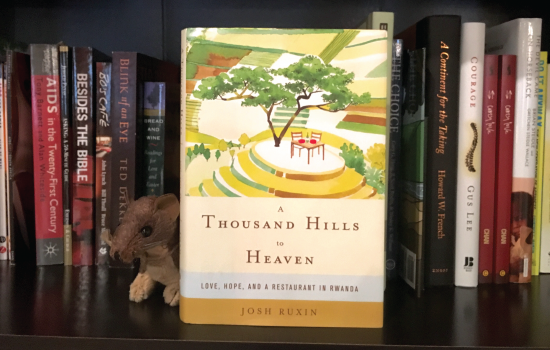Today, Jake Smith, our director of engagement, reviews the first section of May book club selection, “A Thousand Hills to Heaven.”
Summary
It was late when I landed in Kigali, Rwanda, a few weeks ago. Weary from travel, but hungry, my Blood:Water colleague, Barak Bruerd, who was already in Kigali, was eager to introduce me to a place that I had heard so much about but never been. As we stepped into the canopied dining room overlooking the Kigali hills, this place felt special. The staff, a smiling group of local Rwandans, were eager to serve. The food was diverse and delicious, something you’d be more likely to eat in New York than Africa. I was in Heaven.
“A Thousand Hills to Heaven: Love, Hope, and a Restaurant in Rwanda” tells the story of Heaven, a gourmet restaurant in Kigali, Rwanda. The story of this restaurant anywhere in Africa would be remarkable. However, when you learn more about the atrocities of the Rwandan genocide in 1994, you appreciate even more the uniqueness of not only Heaven, but Rwanda as well.
Josh Ruxin’s story of how he and his wife created a life and healing in Rwanda is just as extraordinary. In the early chapters, he sets the stage of how working in a country that has been ravaged by war and death only a few years before creates unforeseen challenges. How do you build trust in a place where so many were betrayed by their neighbors? How do you build the trust of your own spouse whom you have asked to join you on this adventure in Rwanda? How do you begin to do the right thing in regards to long-term development when people are starving right now?
Themes
Reconciliation; stepping out of a comfort zone; empowerment versus aid; responsibility
Powerful Lines
- “They were concerned about sustainability and the cultivation of a culture of dependency. They didn’t want me to start something that they might not have the resources to maintain after we moved on. People from the West always came and then moved on, sometimes leaving empty, unfinished business clinics and schools behind. They came with gifts–free medicines, shoes, fertilizer, books–but when those were gone, what then? You’d have a community accustomed to receiving and not to creating and purchasing. You’d have a community dependent on the outside. Dignity and motivation would be lost, and you’d leave behind something worse than you found.” (69)
- “Poor kids are often pawns in high-stakes games for donor dollars.” (73)
- “The term ‘cockroaches’ was a horrid label for dehumanizing the Tutsi.” (100)
- “If you did not want to be killed with a rusty machete or beaten to death with clubs with big nails sticking through them, or see your wife and daughters impaled as these other women had been impaled, and if you had money, you could buy your death by bullet, or buy bullets for your wife and children.” (101)
- “But there was something to do first before we could do anything else: People here were starving to death. They needed to eat.” (102)
Questions to Ponder
- After reading about the atrocities of the genocide in 1994, and then reading about how the country is moving forward, do you think the U.S. would respond the same way? Would we be able to forgive our neighbor?
- Josh asked his wife to move to Rwanda with him, something that was out of her comfort zone. If you were asked by a loved one to join them in their mission in a hard place, how would you respond?
- The Rwandan government knew they needed help from Josh, but they were skeptical of his intentions. Were these people stepping in to partner for the long term or merely meeting a short-term need and then leaving. If you were in Africa, what would your stance be? Would you be able to turn away Western aid if it meant jeopardizing the long-term growth of your country?
Challenge
As you partner with international organizations, ask how they are providing dignity and motivation for the communities in which they work, not merely meeting an immediate physical need.
More Stories:
Categories

